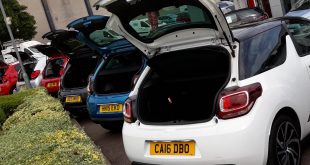RAC patrols rescued 3,426 motorists whose vehicles may have fallen victim to the UK’s pothole-ridden roads in the first three months of 2020 – more than during the same period last year.
Data from the RAC Pothole Index shows this represented a massive 64% increase of 1,337 compared to October to December 2019 (2,089) and 150 more than the first quarter last year (3,276) – a rise of 4.5%.
The start of the coronavirus lockdown – which came into force on March 23 – however meant there were nine days when far fewer cars were on the country’s roads, so the actual number of pothole-related breakdowns may have been higher under normal conditions.
In the first quarter of 2020 breakdowns resulting from damaged shock absorbers, broken springs and distorted wheels that are most likely to be attributable to poor road surfaces, made up 1.6% of all the RAC’s call-outs for its individual members. This was considerably up on Q4 2019 when the figure stood at 0.9% and marginally up on the same period a year ago – 1.5%.
The RAC’s Pothole Index, which is an accurate long-term indicator of the health of the UK’s roads, suggests the overall standard of the roads has improved a little as the Index currently stands at 1.6, down from 2.3 in the same period last year and slightly down on Q4 2019 (1.7).
This does mean however that drivers are still 1.6 times more likely to break down as a result of pothole-related damage than they were back in 2006 when the RAC first started collecting data.
While winter was relatively mild overall, the UK suffered catastrophic flooding in some areas between November 2019 and February 2020, which is bound to have taken its toll on overall road surface quality.
“The jump in pothole-related breakdowns from the last three months of the year to the first quarter of the next year is always the largest as winter weather has the greatest effect of all in wearing down our roads,” said the RAC’s Nicholas Lyes.
“While millions of cars are mostly confined to streets and driveways during the coronavirus lockdown, people are more reliant than ever on their vehicles to buy food and important household items.
“The last thing any driver needs on the way to do their essential weekly shop is to suffer a nasty pothole-related breakdown that puts their car out of action, especially with fewer garages open than usual. This means the quality of local roads is, ironically, is as important as ever.”
 Automotive Blog Automotive Blog brings you the latest news, car reviews and information on the automotive industry.
Automotive Blog Automotive Blog brings you the latest news, car reviews and information on the automotive industry.




